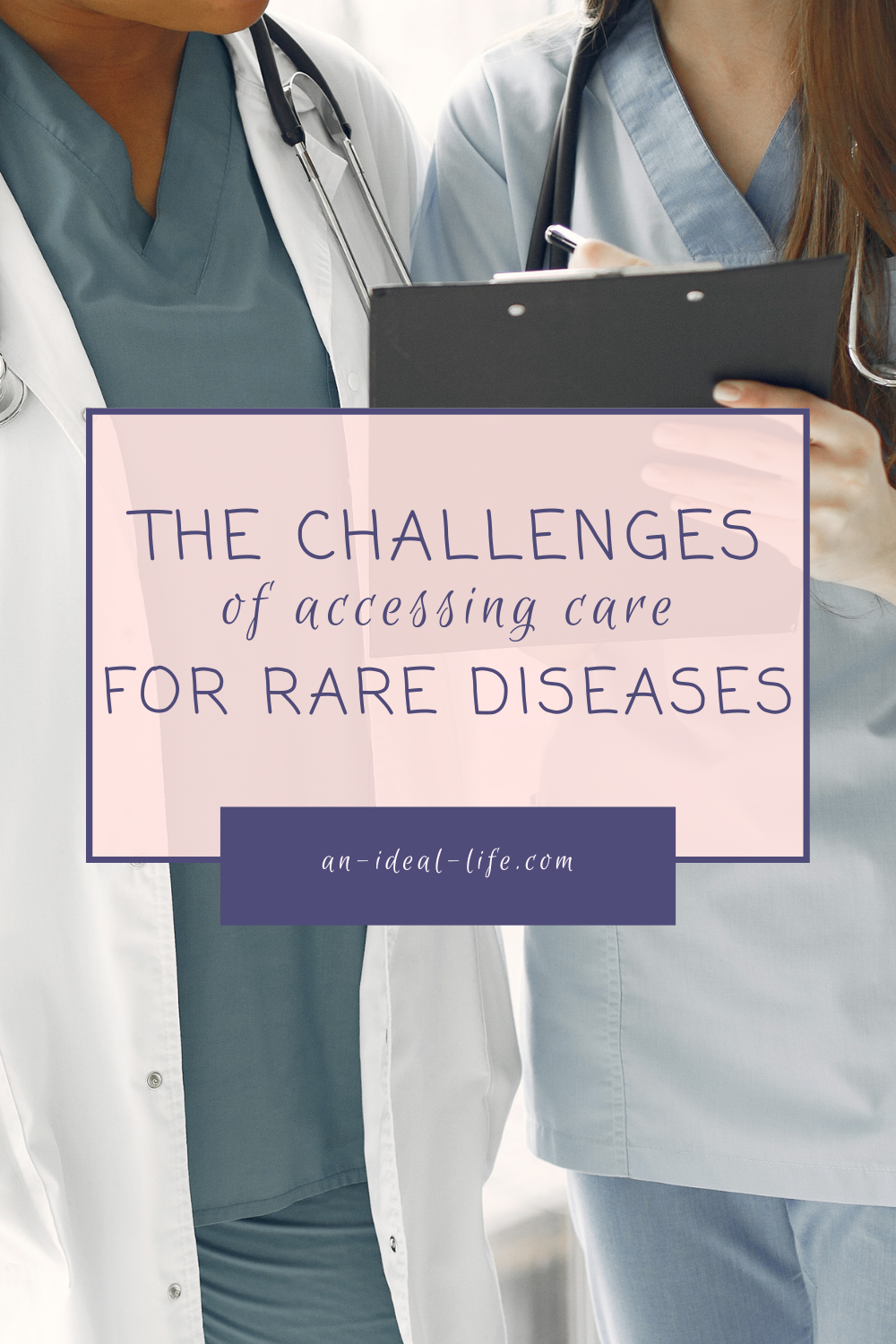The Challenges of Accessing Care for Rare Diseases
Accessing care for rare diseases poses numerous challenges for individuals seeking medical care and support. Whether you’re diagnosed with a rare disease yourself or love someone who has been, we hope to raise awareness and advocate for improved healthcare resources and support systems for those with rare conditions.
*This post may include affiliate or referral links. At no extra cost to you (and with a special reader discount, in some cases!), I’ll receive a small commission or other rewards to help support An Ideal Life. As an Amazon Associate, I earn from qualifying purchases*
The information in this blog post is provided for educational and informational purposes only and should not be construed as medical advice. The content is not intended to be a substitute for professional medical advice, diagnosis, or treatment. Always seek the advice of your physician or other qualified healthcare provider with any questions you may have regarding a medical condition. Never disregard professional medical advice or delay seeking it because of something you have read online. The author of this post is not a licensed medical professional and does not assume any liability for any actions taken based on the information contained in this post.
Lack of Awareness and Understanding
One of the foremost challenges in accessing care for rare diseases is the lack of awareness and understanding within the medical community. Many healthcare professionals may have limited knowledge or experience in diagnosing and treating rare conditions. This can lead to delayed or misdiagnosed cases, or even cases of medical gaslighting, prolonging the suffering and uncertainty for patients. Increased efforts are needed to enhance medical education and training on rare diseases, ensuring that healthcare providers are equipped with the necessary knowledge to identify and manage these conditions effectively.
Diagnostic Delays
Rare diseases often present with unique symptoms and can mimic other more common ailments, making them difficult to diagnose accurately, another of the most exacerbating challenges of accessing care for rare diseases. The absence of specific diagnostic tools or tests tailored to rare conditions further exacerbates the problem. Consequently, individuals may endure a prolonged and frustrating journey before receiving an accurate diagnosis, leading to delayed treatment and management plans. Collaboration between medical professionals, researchers, and advocacy groups can facilitate the development of specialized diagnostic techniques and guidelines for rare diseases, improving diagnostic accuracy and timeliness.
Limited Treatment Options
The scarcity of research and clinical trials for rare conditions often translates into limited treatment options and increased difficulty in accessing care for rare diseases. Pharmaceutical companies may hesitate to invest in developing medications for conditions affecting a small number of patients. As a result, individuals are left with few or no targeted therapies, forcing them to rely on off-label use of medications or repurposed treatments with uncertain outcomes. Encouraging policies that incentivize research and development for rare diseases, along with fostering collaboration between academia, industry, and patient communities, can help bridge the treatment gap.
Financial Burden
Rare diseases can impose a significant financial burden on individuals and their families. The high cost of medications, specialized medical equipment, frequent doctor visits, and necessary interventions can be overwhelming. Moreover, insurance coverage may not adequately address the unique needs of those with rare conditions, leaving patients to bear substantial out-of-pocket expenses. Government initiatives, such as expanded insurance coverage and financial assistance programs, can alleviate the financial strain and ensure that individuals have access to the care they require without undue financial hardship.
Fragmented Care and Lack of Specialists
Given the rarity of these conditions, access to healthcare providers and specialists familiar with specific rare diseases can be a challenge. Patients may find themselves seeking care from multiple providers across various medical disciplines, leading to fragmented and disjointed care. Additionally, locating specialists who have expertise in a particular rare disease may require travel, which further hampers accessibility. Efforts should be made to establish multidisciplinary clinics and centers of excellence, where individuals can receive comprehensive care from a team of specialists with a deep understanding of rare diseases.
Emotional and Psychological Impact
Living with a rare disease can have a profound emotional and psychological impact on individuals. The isolation and sense of being misunderstood or neglected can lead to feelings of frustration, discouragement, and even depression. Mental health support tailored to the unique needs of those with rare conditions is crucial but often overlooked in traditional healthcare systems. Integrating mental health services within rare disease care settings and fostering peer support networks can provide individuals with the emotional and psychological support they need to cope with the challenges they face.

If you’re struggling with your mental health, consider utilizing Talkspace online therapy.
Advocacy and Support
In the face of these challenges, individuals facing the challenges of accessing care for rare diseases often become fierce advocates for themselves and their communities. Patient-led organizations and support groups play a vital role in providing emotional support, sharing information, and driving research initiatives. These networks enable individuals to connect with others who can empathize with their experiences and offer invaluable guidance and encouragement. Increasing recognition and support for patient advocacy organizations can empower individuals to have a collective voice, leading to positive changes in healthcare policies, research funding, and overall societal awareness.
In recent years, advancements in technology and the rise of online platforms have played a significant role in empowering the rare disease community. Access to information, support, and advocacy resources has become more readily available, providing individuals with rare diseases the opportunity to educate themselves, connect with others, and advocate for their needs.
Online Communities and Support
The internet has become a powerful tool for individuals with rare diseases to connect with one another. Online communities, forums, and social media groups dedicated to specific rare conditions allow individuals to share experiences, seek advice, and find emotional support. These platforms foster a sense of belonging, combatting the isolation often experienced by those living with rare diseases.
Patient Education and Resources:
The digital age has facilitated the dissemination of valuable information about rare diseases. Online resources, including reputable websites, blogs, and educational materials, offer a wealth of knowledge regarding different conditions, treatment options, and self-management strategies. Empowering individuals with rare diseases with accurate and reliable information helps them make informed decisions about their healthcare and engage in shared decision-making with healthcare providers.
Amplifying Advocacy Efforts
Social media platforms have become instrumental in amplifying advocacy efforts for rare diseases. Hashtags, campaigns, and awareness initiatives spread rapidly, raising public awareness, challenging stigmas, and encouraging policymakers to take action. The ability to connect with a broader audience and share personal stories has helped shed light on the challenges faced by the rare disease community, promoting understanding and garnering support.
Research Collaboration and Crowdsourcing
The digital landscape has facilitated research collaboration and crowdsourcing initiatives, enabling individuals with rare diseases to actively participate in advancing scientific knowledge. Online platforms connect patients, researchers, and clinicians, facilitating data sharing, patient registries, and participation in clinical trials. These collaborations have the potential to accelerate research, identify potential treatments, and empower patients to contribute directly to the scientific community.
The challenges faced by individuals when it comes to accessing care for rare diseases are multifaceted, but the digital age has provided avenues for empowerment and support. The internet has connected individuals with rare diseases, fostering online communities that provide emotional support and information-sharing. Patient education resources have become more accessible, enabling individuals to become informed advocates for their health. Moreover, social media platforms have amplified advocacy efforts, bringing attention to the unique challenges faced by the rare disease community and driving policy changes. Collaborative research initiatives and crowdsourcing platforms have empowered individuals to actively contribute to scientific advancements.
By recognizing and leveraging these digital resources, we can further empower the rare disease community and drive positive change. Increased access to information, support, and collaboration platforms can help individuals navigate the challenges of accessing care for rare diseases while fostering a sense of community and empowerment. Together, we can work towards a more inclusive and supportive healthcare system that addresses the unique needs of individuals with rare conditions, ensuring they receive the care and support they deserve.







